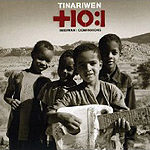Tinariwen, Imidiwan: Companions

In spite of the bright, sparkling melodies, wonderfully “round”-sounding notes, and sweet, village-harmony backing vocals, there’s a deep, tragic sense of sadness and loss to Tinariwen’s Imidiwan (which translates as “Companions” in the band’s native language, Tamashek; hence the subtitle). The music bounces and meanders its way along like a joyful procession winding deliberately through a rocky, sun-baked country, but beneath the surface, there’s regret and pain and pride and sorrow, all nodding along slowly.
That kind of dichotomy sits at the heart of Imidiwan, and maybe even at the core of the band itself. Their collective history reads like something out of a novel: a band of young Tuaregs, growing up in refugee camps away from their homes, sidelined by countries whose national boundaries ignored their existence, get trained in Libya to be soldiers and end up fighting for freedom for their people both in Libya and in northern Mali.
All the while, they work at inventing their own unique style of music that fuses traditional Tuareg music with protest songs, rock & roll, Algerian pop, and reggae, recording and distributing homemade cassettes of their music throughout the region. They’re accidentally “discovered” by a band of French musicians and become international stars overnight; from stateless exiles to world-music icons, a real-life musical rags-to-riches story.
Of course, the Horatio Alger sheen covers up the fact that the founding members of Tinariwen came of age in the middle of a series of wars and uprisings and spent a fair amount of their adult lives trying to win independence for their people in various parts of northern Africa — the most recent peace agreements between Tuareg rebels and the military forces of Mali and Niger are barely a year old. When you look past the cheery singing and sunny melodies and read the translated lyrics, the band’s still singing about revolution and freedom fighters and the need for the Tuareg people to wake up and stand tall.
Then there’s the music. When I first heard of the band, I’d envisioned something more akin to Rachid Taha’s melding of electric guitars with rai electronics, but they’re nowhere near; hell, they’re nowhere near even Arabic music, truthfully. Instead Tinariwen have taken in all those influences above and come up with something that sounds most like electrified, spiritualized blues; “Tenhert,” in particular, could’ve crept right off of a John Lee Hooker album, with that repetitive, down-low guitar line and the half-sung, half-spoken lyrics. (Well, except for that rocksteady chicka-chicka guitar and backbeat, that is.)
“Assuf Ag Assuf” both mine similar territory, with almost country-blues-sounding choruses, chiming/scraping guitars, and a Ry Cooder-esque slide thing going on in the background. “Intitlayaghen,” for its part, sounds a lot more folky, including a bit that sounds to my ears like Billy Bragg/Phil Ochs jangle, wedged on top of a gorgeously sing-song-y chant, while “Ere Tasfata Adounia” makes me think of a Wild West theme, all windswept desert and murkiness. The title track (which is also the first one on the album), “Imidiwan Afrik Temdam,” is probably the most out-and-out “African-sounding” here, but even then it’s colored by the electric guitar and that nicely-raw bluesiness.
It’d be easy to point and claim that Tinariwen’s obviously incorporated American-style blues into their music, but honestly, I don’t think that’s the case. The roots of the blues are in West Africa, so I think the band took the rock & roll influences they loved as kids and stripped them down to a sound that was familiar to them, in effect bringing the music in a full circle. In that sense, there’s a musical dichotomy, as well — Tinariwen are both modern and traditional, Western world and African, a true melding of the styles of both.
And it’s great; just flat-out great. Frontman Ibrahim Ag Alhabib’s guitar is hypnotic, scraping and rolling along like a beaten-up car headed down a rocky track, while the vocals remind me of the celebratory, unabashedly happy sounds of Damon Albarn’s Mali Music collaboration. Even not knowing the language, the sound of the words is somehow familiar, so much so that I can now catch myself muttering bits and pieces of Tamashek from one song or another. It’s gritty and warm and deceptively simple
But how in the hell does it come together, really? How is it that something so disparate, with so many pieces cobbled together on top of one another, actually work?
For me, it didn’t entirely make sense until I finally watched the companion DVD to the album, a short film by Jessy Nottola. The film moves slowly, even by music-documentary standards, with scattered half-conversations in French and Tamashek with members of the band as they roam seemingly from one stark, rocky village to another, riding on dusty backroads with their electric guitars in hand. And watching them sit, and talk, and nonchalantly, effortlessly play this warm, beautiful, yet bleakly sad music they make, the whole time with the backdrop of the Sahara behind them, it clicked, all of a sudden.
It’s partly in the name, “Companions,” which captures the journey these people have essentially been on for most of their lives, working as a musical collective; in a lot of ways, Imidiwan is about friends, the people who travel alongside you and who you care about. Beyond that, though, there’s the band’s inherently nomadic nature — they themselves are the travelers, wandering and playing music, not caring what country happens to claim their home but claiming it all as their own.
There’s no dichotomy, in the end; it’s all one, the boundaries erased like the imaginary lines they are, whether viewed on a map or in-between styles of music.



[…] and blues. The result is, well, pretty incredible to see/hear. I was able to review 2009?s Imidiwan, and it was far beyond anything I’d […]